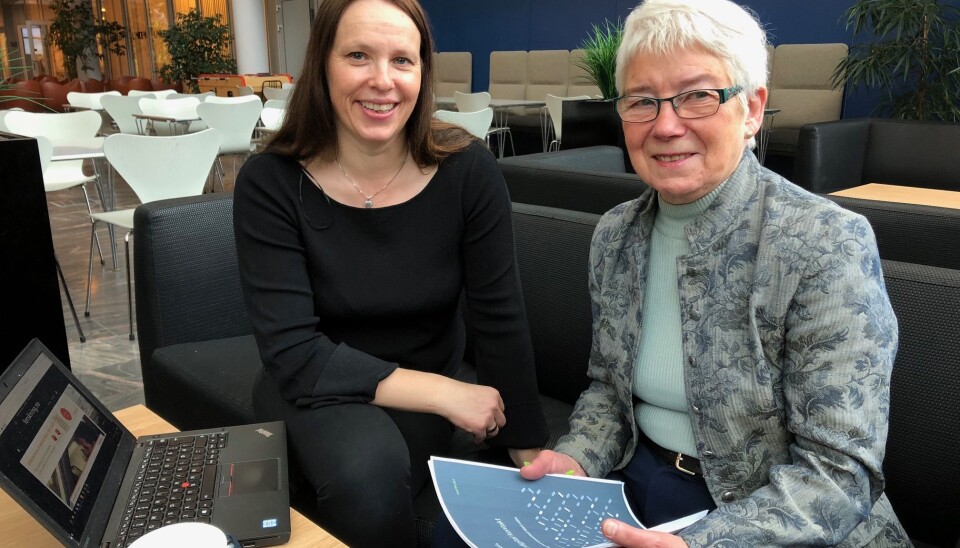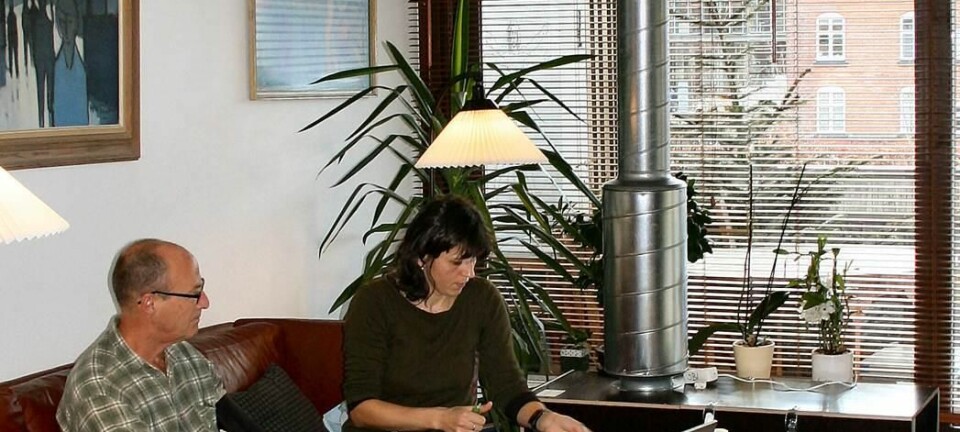This article was produced and financed by Norwegian centre for E-health research

Seniors and technology: help from family members is not always the best solution
Researchers believe that seniors need a course where they can ask the ‘silly’ questions.
Several organisations have offered courses to teach seniors about technology.
Researchers, Inger Marie Holm and Asbjørn Fagerlund Johansen, at the Norwegian Centre for E-health Research, have now completed a qualitative study on course participants and course leaders to learn more about the effects of the training.
The objective was to find out whether such courses help seniors maintain their social networks - to avert loneliness.
The researchers also wanted to investigate the barriers that prevent seniors from using technology.
Arriving at a main conclusion was, however, difficult. The seniors who participated on the courses were an incredibly complex group with many different starting points. Therefore, it is difficult for the researchers to say anything about them as one group.
“Many seniors are very technology-oriented and are up-to-date with Skype, Facebook and online banking, yet others do not have any relation to technology at all. They are not a homogenous group and it is impossible to separate them into distinct categories,” says Inger Marie Holm.
Earlier research also shows that seniors need different types of training, and that many seniors master digital tools very well.
Fewer telephone calls
Despite this, the researchers found some main characteristics. Many seniors say they became lonelier after society took a sharp technological turn. Fewer people telephone each other, as they prefer text messaging and Facebook. Those who do not use these channels are at risk of losing touch with society.
“On the other hand, there are seniors who are tired of having so much contact with people. They prefer to use technology for their specific interests, for example. photo editing. They attend courses because they want to learn these things, not necessarily to learn how to communicate with people through technology,” explains Holm.
Choose to live without technology
Bitten Barman-Jenssen recognises herself very much in this statement. The 81-year-old from Tromsø is more active in social affairs than the average person and was a former leader of the Council for Seniors in the municipality. She believes that many seniors are happy to live without social media.
“We can reject more. After all, we are adults, she laughs, then adds:
“I have Facebook, but I don’t think technology contributes to reducing loneliness. In my experience, seniors would prefer to have someone to talk to one-on-one.”
Many seniors in the study said that they felt that technology resulted in more loneliness precisely because there is no reason to go out. There is no one to meet at the post office anymore.
“We must never get to the point that it is abnormal to talk face-to-face with people. We must have meeting places,” stresses Barman-Jenssen.
Digital threshold
Barman-Jenssen knows many seniors who have attended courses on how to use digital tools. She asks if they actually manage to apply their acquired knowledge.
“When they get home, they have problems getting it to work and this stops them from buying what they need to learn it. I understand very well why pensioners become frustrated when they can’t get Skype to work,” says the active pensioner.
She believes that it would be a good idea if lower secondary school pupils visited seniors in their own homes, for example, during elective subject lessons. They could sit down and show them how it’s done in their own living rooms. Researcher, Inger Marie Holm, agrees.
“During the study, someone suggested a ‘drive-in’ service in towns and cities. That is, centres where seniors could go to get help. In rural areas, volunteers could visit people who needed advice.
Drop-in help from children
It is common that children and grandchildren help when the computer crashes or when grandad wants to open a Facebook account. But it is not always beneficial.
Many of the seniors found it a negative experience and said that children and grandchildren are often impatient and lack teaching skills. For example, many of the seniors had been given an e-mail account with a random password that was impossible to remember.
“Many feel that family members are not really interested in spending time on helping them with technology,” says Holm.
Bitten Barman-Jenssen experiences the same amongst her friends. They get their children to help them, but they only fix things. Parents are unable to follow what they are doing or they are not taught anything. Children and family members do not necessarily have the right teaching skills and tension arises.
“They don’t help you to understand how it’s done,” she says.
Fear also plays a role
Therefore, it is important that seniors are offered the courses they need with instructors to whom they can ask the ‘silly’ questions. Often a lack of interest in technology is also about fear.
“Many seniors show unwillingness to learn new things, but at the same time say they fear using new technology. It can be something as simple as not understanding how a computer works. They think they can do irreparable damage,” says Holm.
Must learn online banking
Individual follow up and repetition are important. The rule of having to hear information seven times before it is remembered, also applies to seniors. In addition, there is the anxiety attached to not being able to do it and shame because it is difficult.
“One of our findings was that many wanted to learn technology to do online banking. Some seniors do not have their finances in order because of this, as such it must be prioritised. This concerns human dignity,” says the researcher.
Small courses are best
Bitten Barman-Jenssen believes that this is best addressed with small courses, preferably arranged by organisations such as the Red Cross, and where seniors with educational insight can help.
“Seniors who command technology can travel to seniors who do not. Large courses are not helpful,” she says. Another question is whether everyone should attend, regardless of whether they want to.
“As a society, we must accept that not everyone can or will want to, and not everyone will be able to learn it. What should we do with them, actually?,” she asks.
She encourages all seniors to throw themselves into technology.
“If you have a computer and can play patience, you can also learn online banking. But someone has to help you along the way,” says Bitten Barman-Jenssen.
































